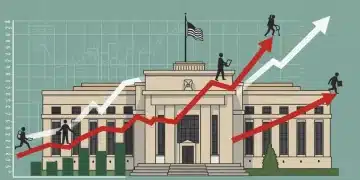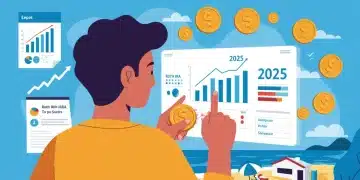Bipartisan tax cut extension moves forward: what it means for you

Anúncios
The bipartisan tax cut extension increases disposable income for taxpayers, stimulating consumer spending while potentially reducing government revenue, which may impact public services.
Bipartisan tax cut extension moves forward, and it could reshape financial landscapes for many. Curious about how this will impact your budget? Let’s dive in and explore the details together.
Anúncios
Understanding the bipartisan tax cut proposal
Understanding the bipartisan tax cut proposal is crucial for taxpayers looking to navigate the financial implications of new legislation. This proposal aims to provide relief to numerous individuals and businesses alike. So, what exactly does it involve?
Key Elements of the Proposal
The proposal encompasses a range of tax benefits designed to stimulate the economy and support the middle class. These benefits include:
Anúncios
- Reduction in income tax rates for individuals
- Increased deductions for families
- Tax credits for businesses to encourage hiring
By focusing on these elements, lawmakers aim to foster economic growth and improve the financial situation of many households.
Potential Impact on Taxpayers
For individual taxpayers, the bipartisan tax cut could mean more take-home pay. This can lead to increased spending opportunities, further boosting local economies. As for businesses, enhanced tax credits might incentivize hiring and investment, ultimately creating jobs.
It’s essential for citizens to stay informed about these changes. Understanding how the proposal might affect your finances allows you to plan better for your future. The bipartisan approach also highlights cooperation between parties, which is critical for effective governance.
Everyone benefits from a well-structured tax system, and awareness of these legislative changes prepares taxpayers for the potential outcomes. With clear, targeted tax cuts, families can potentially see substantial savings, which can be used for important life expenses like education and healthcare.
Stay Updated
As discussions around the tax cut continue, it’s vital to follow updates closely. Keeping an eye on legislative changes ensures you are prepared for shifts in your tax obligations or benefits.
Key benefits of the tax cut extension

The key benefits of the tax cut extension are crucial for understanding how it affects taxpayers and the economy. This extension offers several advantages that can positively impact individuals and businesses alike.
Increased Disposable Income
With reduced tax rates, many families will experience an increase in their disposable income. This means more money available for essential needs and personal expenses. Families can use these funds for:
- Paying off debts
- Savings and investment opportunities
- Purchasing goods and services
The additional financial flexibility encourages consumer spending, which is vital for economic growth.
Support for Small Businesses
The extension also benefits small businesses drastically. By providing tax credits, it helps these vital parts of the economy thrive. Business owners can invest more in their operations, leading to Enhanced productivity and job creation.
Moreover, tax breaks can allow entrepreneurs to allocate resources towards hiring new employees or upgrading technology. This dynamic approach nurtures innovation and sustainability in the marketplace.
When combined with increased consumer spending, the positive effects of these benefits can create a ripple effect throughout the economy, bolstering local communities and supporting job growth.
Long-Term Economic Growth
Overall, the tax cut extension is designed to stimulate long-term economic growth. When more people have jobs and businesses thrive, it leads to a robust economic environment. Increased tax revenue from these growths can also encourage future government spending on infrastructure and public services.
By understanding these key benefits, taxpayers can recognize the importance of the proposal and its potential to improve their financial situation and overall economic health.
Impact on individuals and businesses
The impact on individuals and businesses from the recent bipartisan tax cut extension is significant. Understanding these changes is essential to grasp how they will influence everyday life and economic growth.
Effects on Individual Taxpayers
For many individuals, the tax cut means more money in their pockets. As tax rates decrease, people can expect lower deductions from their paychecks. This increase in disposable income allows families to invest more in their needs and wants.
- Improved financial security for families
- Enhanced capacity to save for future goals
- Boost in spending on education, healthcare, and housing
Additionally, with increased disposable income, there is potential for greater consumer spending, which can stimulate local economies.
Benefits for Businesses
Businesses also stand to gain from the tax cut extension. With lower tax obligations, companies can reinvest their savings into operations. This may lead to:
- Expansion of services and product offerings
- Increased hiring and improved employee benefits
- Enhancement of marketing efforts
With more resources, businesses can focus on growth and innovation, which is crucial in a competitive market. As businesses expand, they create more jobs, contributing to overall economic stability.
Furthermore, small businesses, often the backbone of the economy, can particularly benefit from tax breaks that provide them with the necessary support to thrive. Understanding this aspect is vital for entrepreneurs looking to navigate the current economic landscape.
The tax cut extension creates a ripple effect that not only uplifts individual taxpayers but also provides businesses with the tools they need to succeed. By investing in their growth, both individuals and businesses can experience a more robust economic environment that mutually benefits all parties involved.
Future implications for taxpayers

The future implications for taxpayers following the bipartisan tax cut extension can shape various aspects of financial life. Understanding these implications is essential for effective personal planning and financial strategies.
Long-Term Financial Planning
With tax reductions expected to last for some time, individuals can benefit from devising long-term financial plans. Increased disposable income may allow families to save more effectively for:
- Higher education costs
- Retirement funds
- Home purchases and improvements
By taking advantage of tax savings, taxpayers can create more stable financial futures. This proactive approach can lead to lower debt levels and better credit scores.
Impact on Government Services
However, the tax cut extension might lead to reduced government revenue, which can influence public services. Individuals should be aware of potential changes, such as:
- Increased fees for government services
- Changes in funding for education and healthcare
- Possible reductions in public infrastructure projects
These factors can affect the overall quality of services available to the public, making it vital for taxpayers to stay informed about legislative developments.
Despite the temporary benefits of increased take-home pay, the long-term effects on community resources should not be overlooked. As taxpayers experience changes in their financial situations, understanding how to adapt to potential service changes is essential. Future discussions about tax policy will also be important, as lawmakers assess the balance between tax relief and funding for public services.
Opportunities for Engagement
With these implications in mind, taxpayers may want to engage more actively in local governance. Advocacy for responsible tax policies and community services can strengthen the connection between taxpayers and their representatives. Participating in discussions about budgeting and resource allocation can lead to better outcomes aligned with taxpayers’ needs.
FAQ – Frequently Asked Questions about the Bipartisan Tax Cut Extension
What will the bipartisan tax cut extension mean for my paycheck?
The tax cut extension will likely result in a lower tax rate, increasing your take-home pay and providing more disposable income.
How might the tax cut extension affect government services?
It could lead to reduced government revenue, potentially impacting funding for public services like education and infrastructure.
What are some ways to utilize the extra income from the tax cut?
You can save more for future goals, pay off debts, or spend on essential needs, which helps stimulate the economy.
Why is community engagement important during tax changes?
Active engagement allows taxpayers to advocate for responsible fiscal policies and stay informed about how changes affect local services.





